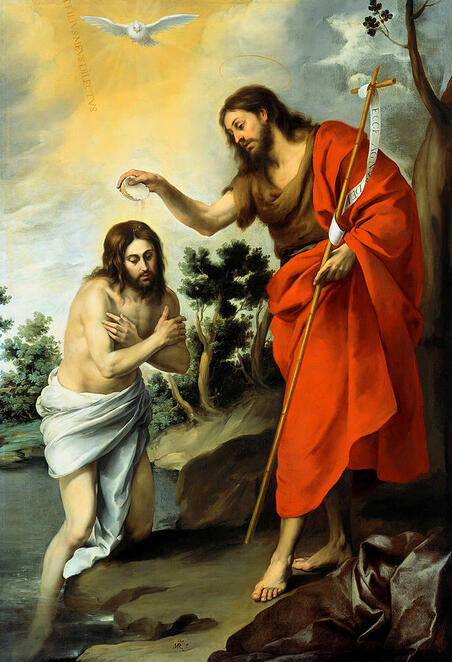|
Today, Holy Mother Church celebrates the Feast of the Baptism of the Lord, in which She gives honour and veneration to the event that not only prefigured the Sacrament of Baptism, but also in which the Holy Trinity revealed Themselves to the people.
Having reached the age of 30 - the age when men could be ordained into the Jewish priesthood - Our Lord Jesus Christ begins His Public Ministry by coming to His cousin and Precursor, St. John the Baptist, to receive from him baptism. This baptism is not, as some think, the same as the Sacrament of Baptism that we receive upon our initiation into the Catholic Faith, but rather was a sacramental, that is, a sign pointing to the true Sacrament that would be later instituted by Christ Himself. St. Matthew's Gospel, which is used this year, relates to us that Our Lord came to St. John from Galilee to the Jordan, where St. John was preaching and baptising. When Our Lord approaches John, we are told "John stayed Him, saying: I ought to be baptised by Thee, and comest Thou to me?" St. John, at least on the surface on things, was shocked that his Cousin and Saviour should come to him for baptism, rather than for himself to be baptised by Our Lord. From this we can see, contrary to the Modernist nonsense of our times, that St. John was fully aware of who Christ was. Our Lord responds to John saying: "Suffer it to be so now. For so it becometh us to fulfil all justice". That is, both Christ and John knew that this baptism was not the Sacrament and thus could not remove sins, and that Our Lord had no need of such a Sacrament anyway because He was sinless, but in order to fulfil justice, and to perfectly follow the Will of God, Christ bowed Himself in humility to the authority of His Precursor, whose happy task was to make the path straight for the Lord, and suffered to be baptised by him. By this, Christ showed us a true example of receiving the later Sacrament, as He in all things provides an example to His Church. And so, John suffered Him to be baptised. The Apostle then writes that as Christ ascended from the Jordan, the heavens were opened, and John sees the Holy Spirit descend upon Our Lord in the form of a dove, a sign of peace, of which Christ was the Prince of Peace. Then the Voice of the Father speaks saying, "This is My Beloved Son, in Whom I am well pleased". That is, Behold My Beloved Son, the Apple of My eye, the Heart of My Heart, the Joy of My Joy, the Fruit of My Paternity, the Heir of My Treasures, in Whom I am eternally pleased, and in Whom I exult and love beyond all other, for He is the perfect Image of Me, and the Mirror of My Face. Behold Him, Whom I send unto you to save you from your sins, even as I promised from of old. Behold Him, Who I most affectionately embraced as I sent Him to you, and gave My Paternal Blessing for His Ministry. Behold My most obedient Son, Who pleases me very much, Who is to guide you back to Me! We can see in this an external image of what happens to each person who is baptised: Christ is the true Priest who confers the Sacrament, the Holy Spirit comes upon the baptised, and the Father calls out: this is My beloved son, in whom I am well pleased. Through the Sacrament, we are adopted by the Eternal Father as His sons [1] and since we are sons of God and brothers of Christ, we share in the inheritance of Christ. We should therefore this day call to mind our own baptism, and at Mass to offer Holy Communion in thanksgiving to God for our baptism, and for the institution of the Sacrament, by which Original Sin and Actual Sin is washed away, and the Gates of Heaven are made open to us. For, as Christ taught, Baptism is necessary for salvation, meaning that those who do not receive the Sacrament as performed by the Church, cannot enter Heaven [2]. ------------------------------------- [1] Every person, regardless of their sex, are adopted as sons by God and are looked upon by Him as sons. The Church teaches that because we are all baptised into Christ, the Son, we are thus part of the Sonship of Christ, and we are made sons of God. Liturgically, there is no such thing as a daughter or sister, since even Catholic women are sons of God. This is why, incidentally, priests should not use the phrase brothers and sisters, but only the phrases brothers or brethren, as stated in the Latin text of the Mass, and why the phrase brothers and sisters never historically occurred in the Roman Rite. This teaching, like many other pre-Vatican II teachings, was abandoned after Vatican II by the Modernists. [2] A "controversial" subject - which is only controversial to modern Catholics whose sensus Catholicus is all by destroyed - regards the status of unbaptised babies. Prior to Vatican II, the standard teaching, coming from St. Thomas Aquinas, was that unbaptised children went to a place called the Limbo of Infants, a place of perfect natural happiness, where the unbaptised babies lived for eternity without any pain and suffering. According to St. Thomas, the Limbo of Infants exists in infero, or what we in English call hell. This is not the Hell of the Damned - or Gehenna - but a Latin word meaning the underworld in general. Though the babies there are happy and are without pain, they are forever prohibited from the Beatific Vision, that is, from ever seeing God as the Saints do. The question arises: since infants cannot commit Actual Sin, they cannot be sent to Hell, but at the same time, they still have Original Sin inherited from Adam, and so cannot enter Heaven. So where do they go? St. Thomas, and the Church in general, reasoned that a place was created for them by God, which contains neither the suffering of the Damned, nor the beatitude of the Saints. Today, thanks to the Modernists, this teaching is considered "hard" for over-sensitive modern persons, and so is never taught. Rather, the Mercy of God is exaggerated to mean that practically anyone can get to Heaven, even atheists, as many Modernists today blasphemously and absurdly teach. However, for me at least, it is the beast possible explanation that answers the question, and I certainly have no problem accepting it, since it is a rational explanation that doesn't depend on feelings. Incidentally, adults who die without baptism or the desire for baptism go straight to Hell. |
Archives
April 2024
|

